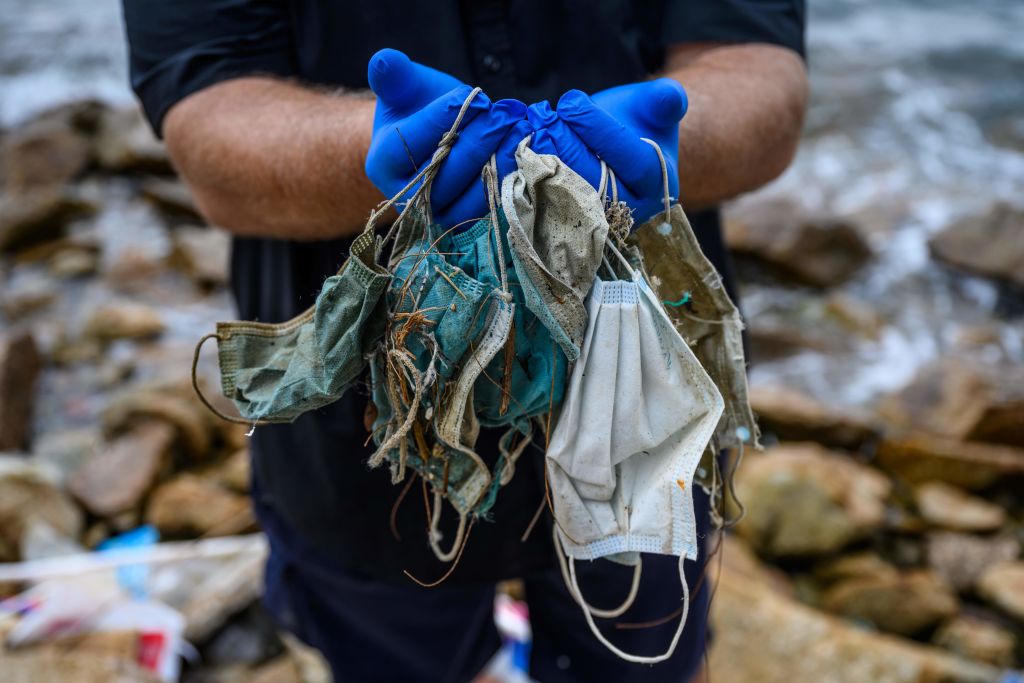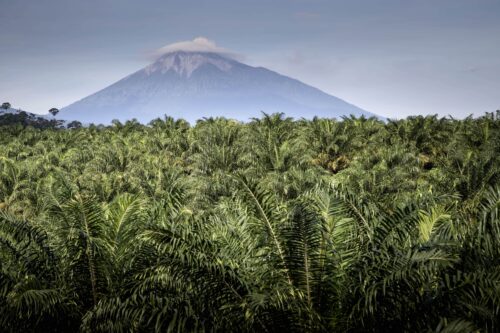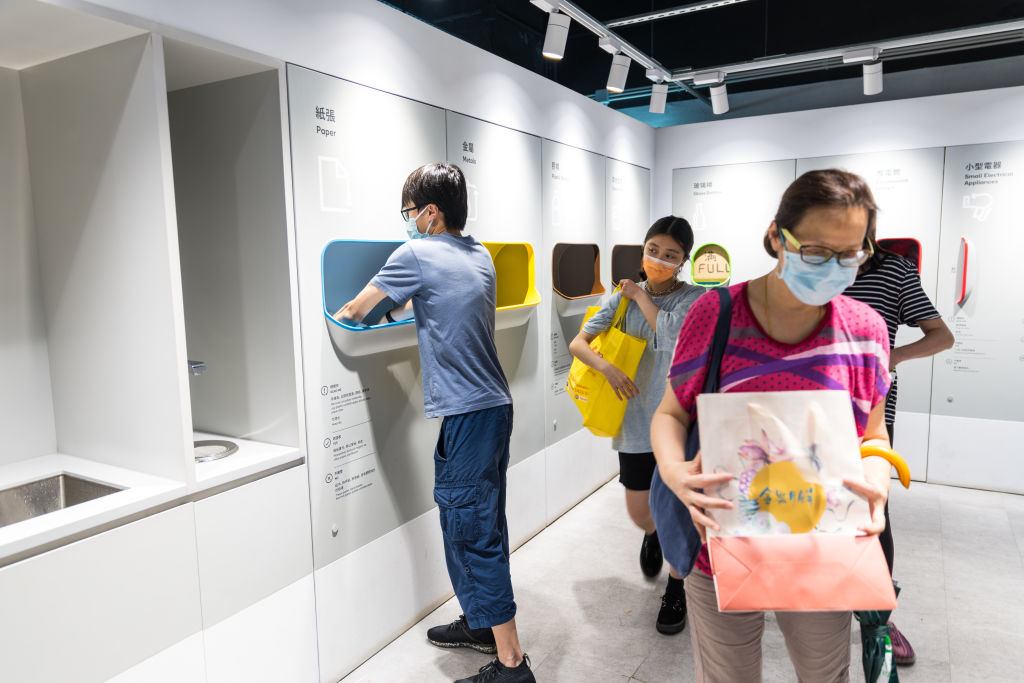Should You Feel Bad About Your Pandemic-Era Plastic Waste?

“Sometimes I want to avoid producing excessive waste and be more environmentally friendly,” said Teresa, a 22-year-old undergraduate in Hong Kong. [1] [1] Pseudonyms have been used for all interviewees to protect their privacy. “But I feel slightly powerless these days. On many occasions, I don’t think I have a choice.”
Every day, Teresa insists on wearing at least a surgical mask due to the ample scientific evidence of the effectiveness of mask-wearing in reducing the risk of COVID-19 transmission. Although she feels guilty about throwing these masks away after each use, wearing a reusable cloth mask is not an option for her. Research has shown that such masks are comparatively less effective than surgical masks and N95 masks in preventing viral transmission. And in Teresa’s experience, even reusable cloth masks are not as environmentally friendly as people think.
“Some reusable [cloth] masks still contain a non-recyclable (PM 2.5) filter to enhance the medical protection,” Teresa explained. “Besides, their durability varies. Some even start to wear out in less than a week!”
In the throes of a climate crisis, consumers in Hong Kong and elsewhere are often told that we are capable of making ethical decisions to contribute to sustainability. But the research we’ve done on waste disposal in Hong Kong throughout the COVID-19 pandemic has revealed an important truth: The idea that consumers can freely choose to be environmentally responsible is likely an illusion. In reality, our decisions are part of wider political and economic systems over which we have little control as individuals.
The pandemic has put this illusion of choice front and center.
Efforts to treat infections and stop the spread of the virus have led to a staggering surge of pandemic-related plastic waste—around 8.4 million tons globally, according to a study published in November 2021. Around 46 percent of that waste comes from Asia. The majority comes from hospitals, but individual demand for single-use medical products—such as face masks, disinfectant wipes, testing kits, medical gloves, and hand sanitizer bottles—has also contributed to this increase.
In early 2021, we embarked on an anthropological research project to track Hong Kong college students’ waste disposal practices. Since the beginning of the coronavirus outbreak, Hong Kong has witnessed a dramatic drop in recycling. Surgical masks have swamped the city, piling up on beaches and trails. Many of the students we interviewed voiced their frustration over feeling like they had no choice but to participate in buying and using disposable goods.
Regardless of whether masks can be reused or not, Teresa’s experience draws attention to the limited life span of all consumer goods. The chemical and material composition of a product, for example, determines the number of times it can be recovered for use. Even items marked as “reusable” cannot be recovered incessantly; they, too, become frail or degraded and must be thrown away eventually.
Moreover, even if a product has been thrown into a recycling bin, there’s no guarantee of how the product will be handled or processed. In 2019, a team of investigative journalists found that almost two-thirds of recyclable wastes collected from housing estates in Hong Kong were being sent to a landfill. More recently, a scandal erupted when reporters documented a government-commissioned recycling outlet flagrantly dumping recyclables.
One student, Thomas, told us that these incidents had led him to distrust the entire recycling industry in Hong Kong. “I genuinely don’t know if the items I put in the recycling bins will be recycled,” he confessed.
In other words, people simply cannot control where their recyclables will end up—even if they do everything “right.”
These controversies around recycling aren’t limited to Hong Kong. Over the past several years, changes in the global economy have caused major disruptions to how waste flows.
In the past, China received and processed much of the plastic waste collected for recycling from elsewhere—including approximately 95 percent from Europe and 70 percent from the U.S. In early 2018, however, China implemented a ban on importing 24 types of recyclable materials (including plastics) under the National Sword policy. The Financial Times investigated the disastrous environmental consequences of this shift by tracking how G7 countries, who produce the majority of the world’s plastic and paper waste exports, responded to China’s ban. They found that G7 countries were largely forced to dump many recyclables at landfills. As of 2018, only 9 percent of plastics in the U.S. were recycled.
But even before the advent of this ban, the vast majority of plastic waste around the world ended up as trash. Researchers estimate around 8 million metric tons of plastic lands in the ocean annually, with deadly effects for ocean life.
The pandemic has intensified this situation; not only are consumers encouraged to use more single-use plastics to prevent the virus’ spread, but the increased reliance on online shopping from home has led to more waste from shipping and packaging materials. Indeed, COVID-19 has only put more pressure on the already failing plastic recycling industry, exposing the global waste management system’s fragility and inadequacy.
Even if we can’t eradicate waste once and for all, we can still make the systems we have more accountable.
In Hong Kong, the government passed a new bill in August of last year that will charge residents for the collection of their municipal waste by weight. The policy encourages waste reduction and recycling practices by explicitly underscoring the “excessive consumption” and “wasteful habits” of Hong Kong residents. The government has also designed a mascot named “Big Waster,” a translation of a pejorative term in Cantonese for a profligate person, who appears in public campaigns urging citizens to adopt a “Save More, Recycle More” lifestyle.
Such moralistic rhetoric presumes that individuals can always self-consciously choose to live a “wasteless” life. But our research presents a more nuanced picture: Even when people are environmentally conscious and want to make more sustainable choices, they struggle to pursue this way of living due to structural limitations—particularly in the face of a public health crisis.
Our argument aligns with the insights of anthropologists Gauri Pathak and Mark Nichter, who highlight the danger of continuing to “place the lion’s share of responsibility for post-consumer waste onto citizens.” For Pathak and Nichter, a strong waste management and recycling system is crucial, but it is not a panacea for ever-growing waste. Not all products are suitable and/or profitable to recycle. Moreover, an unchecked recycling process can even add to water and air pollution. In other words, recycling at best “prolongs, rather than eliminates, disposal.” Overreliance on consumer recycling as a solution to the waste crisis ignores the broader systems that produce these materials in the first place.
So, what can be done? While Pathak and Nichter rightly point out there are no perfectly developed waste management systems that eradicate waste once and for all, we can still make the systems we do have more accountable.
To start, in Hong Kong and elsewhere, policymakers should consider establishing appropriate waste management infrastructure, including building a transparent waste recovery process to ensure that every recyclable is properly handled. Governments should also restrict the production and unnecessary use of environmentally harmful materials such as plastics, as Pathak and Nichter and others suggest, and support research focused on producing durable materials that are less harmful. And when it comes to unavoidable medical waste related to COVID-19, governments can at least mitigate the detrimental environmental impacts through stringent regulations on waste disposal.
Fundamentally, effective waste management needs to break the illusion that the waste crisis can be resolved by making ethical choices on an individual level. The responsibility shouldn’t—and can’t—fall solely on the shoulders of residents like Teresa.
If COVID-19 has taught us anything, it’s that our individual behaviors can have powerful impacts on those around us—for better or worse. But individuals also need adequate infrastructural and regulatory support for their choices to enable the structural transformations needed to protect our imperiled planet. Such a transformation will entail changing the deep-seated social and economic systems that perpetuate waste production and finding new ways of living with fewer plastics.


































